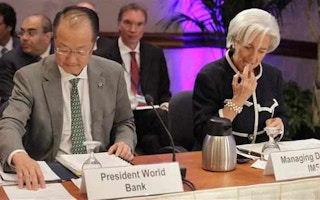The world’s finance ministers should focus on two elements to tackle climate change: setting the “right price” on carbon emissions and phasing out fossil fuel subsidies, International Monetary Fund chief Christine Lagarde said on Tuesday.
At a panel on the opening day of their 2013 autumn meeting, Lagarde and World Bank Group President Jim Young Kim said climate change was a priority for their lending institutions, the first time the two had addressed the issue together in public.
Lagarde said measures to reduce greenhouse gas emissions can add much needed revenue to national economies and steer countries toward the development of cleaner renewable energy.
“There are two things that they should focus on. One is get the (carbon) pricing right and we can help them with that,” Lagarge said, referring to measures such as applying carbon taxes and establishing emissions trading schemes.
“The second thing we can do is gradually phase out and remove the subsidies that apply to energies, and particularly fossil energies,” Lagarde said.
The subsidization of fossil fuels currently amounts to upwards of $485 billion, she said.
The IMF published a report in March making the case for energy subsidy reform.
The paper said that subsidies were expensive for governments, and that rather than helping consumers, they detracted from increased investment in infrastructure, education and health care which would help the poor more directly.
The IMF also plans to publish a report by mid-2014 providing U.S. policymakers with guidance on how to design a carbon tax within the context of broader fiscal reform and fiscal consolidation objectives.
Lagarde and Kim have put a brighter spotlight on climate issues at their respective institutions than their predecessors, stepping up efforts to reducing pollution in the absence of a global agreement on climate change.
“We think a global agreement is critical but there are things we can do right now before we have an agreement that would make a difference,” Kim said.
Kim said the World Bank is focused on three major areas: ensuring sustainable energy for all countries, supporting low-carbon urban planning, and shaping “climate smart” agricultural programs.
“If we focus on those three areas, along with the effort the IMF is making on removing fuel subsidies, that’s a robust response to this climate change problem,” Kim said.










